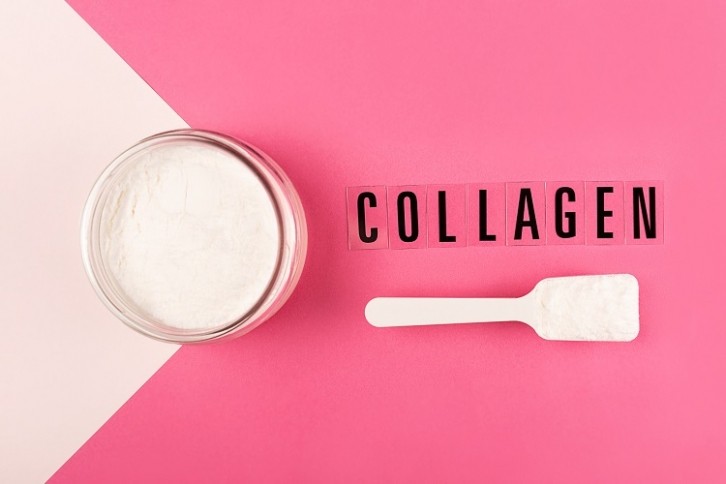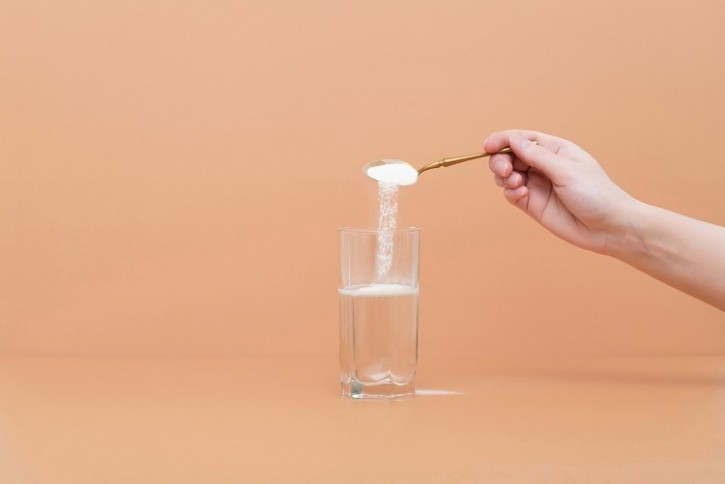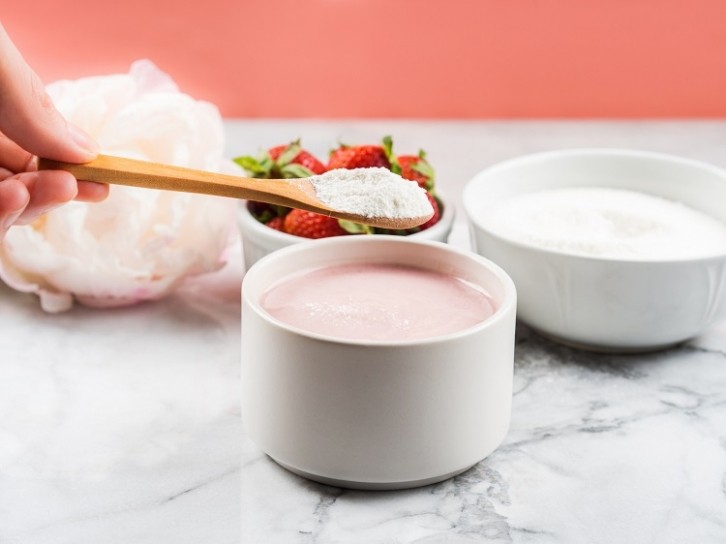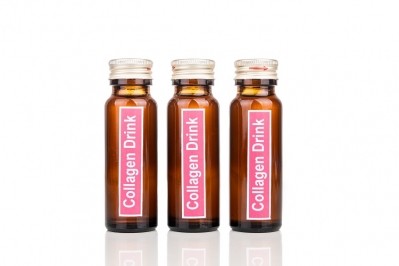Animal-free collagen: The food and drink potential

The collagen market is on the rise, with value expected to increase from $5.1bn (€4.69bn) in 2023 to $7.4bn by 2030, according to market research company Markets and Markets. The vast majority of collagen on the market serves the nutraceutical, sports nutrition and cosmetic industries. Examples of collagen in food and drink products exist, but to a much lesser degree.
Collagen is the most abundant protein in the human body, making up 80% of the ligaments, cartilage and tissues of our skin. At around the age of 30, humans stop producing collagen, which can increase the risk of injury and lead to the appearance of wrinkles.
To help top up supply, consumers turn to collagen sourced from animals such as cows and fish. But in recent years, innovators have been rethinking collagen production with environmental sustainability and animal welfare in mind. Some are turning to cellular agriculture to produce ‘truly identical’ collagen in a lab. Others are leveraging plants to combine amino acids found within human collagen.
With collagen a rarity in food and drink, are these innovators rethinking production for pills, protein powders, and skin creams only? Or should consumers be prepared for animal-free collagen to make a splash in their favourite snacks and refreshments?
How is animal-free collagen made and does it work?
We answer these questions and more in the Part 1 of our deep dive into animal-free collagen, available to read here.
The sustainability credentials of animal-free collagen
Animal-free collagen, whether made from animal cells or plants, purports to be more environmentally sustainable than its conventional counterpart. But exactly how much ‘greener’ is animal-free collagen?
Belgian producer VeCollal is not producing collagen in the strictest meaning of the word, but instead uses plants to make ‘biomimetic’ versions of human collagen types. “As VeCollal has mostly sugarcane as the base material used in fermentation, the footprint is far inferior than the base material for animal collagen, which is usually the hides of cows,” explained founder Tony Van Campen.
Comparing the CO2 footprint of these two base materials suggests VeCollal’s is associated with just 15% of that used in bovine collagen production. “This should come as no surprise either,” stressed the founder. “It is general knowledge that cattle production or fishing has a massive impact on the environment.”
Over in the US, cell-based collagen maker Jellatech has plans to conduct a life cycle assessment to assess the product’s environmental impact cradle-to-grave, but is not there just yet. “We expect a positive environmental impact, notably in reducing greenhouse gases,” founder and CEO Stephanie Michelsen told FoodNavigator.
“This stems from reduced dependency on animals for a variety of applications. Our goal is not only to improve planetary health, but also improve the wellbeing of humans and animals – all while reducing the resources required.”
Demand for collagen has ‘surged’, but will it edge into food and drink?
Collagen is thought to improve the health of skin, hair, nails, joint and bones, and help improve muscle recovery. Seen through this health lens, it is perhaps unsurprising the ingredient is mostly found in supplements, protein shakes, skin cream and even haircare.

But industry is observing a shift as collagen tentatively makes its way into snack bars and infused water products. “Due to increasing consumer awareness on the impact of nutrition on ageing, sports performance, and overall health and wellness, the demand for collagen has surged,” said Jellatech’s VP of business development Jaclyn Shingara.
“You may see collagen as a nutritional or health supplement in the form of a hydrolysed powder, or its derivative gelatin as a texturiser ingredient in confectionery goods, food casings, and much more.
“Collagen is used far more extensively than we might realise.”
In the UK, ProTec Nutra – which makes a vegan collagen from non-GMO corn – is similarly seeing a rise in food and drink applications. Yoghurts, milks and beverages seem to be the new trend for collagen fortification and distribution, product manager Josh Perry explained.
According to Innova Market Insights, 30% of global consumers prefer to consume supplements in food and drink products. This is a trend ProTec Nutra expects will continue to grow.
“Over the last decades, we have seen a sharp rise in collagen containing products,” concurred VeCollal’s Van Campen, citing products available on the market including collagen cookies, collagen bars, collagen pancakes, and collagen coffee creamers.
How will the animal-free collagen sector evolve in the coming years?
As to whether makers of animal-free collagen are specifically targeting the food and drink market, the plant-based producers we spoke to are currently selling into both food and nutraceutical industries.
In the short-term, cell-based collagen maker Jellatech predicts the health market will be its first port of call. But CEO Michelsen suggested this may change down the line. “While our initial focus is on applications related to human health, we have exciting plans to broaden our reach as we scale our technology and streamline costs.
“Expansion into food and beverage is just a matter of time.”
All are convinced animal-free collagen has big potential in food and drink, predominantly driven by a need to move away from resource- and carbon-intensive production methods.

Alternative means of producing collagen can have a ‘big impact’ by achieving the ‘same output’ while alleviating the burden on the environment, Jellatech’s Shingara told us. “While eliminating all animal tissue-derived collagen is not practical (acknowledging the supply of raw materials that would otherwise be wasted), there are applications where animal-derived collagen falls short in fulfilling specific needs.”
For similar environmental and animal welfare reasons, ProTec Nutra believes all things plant-based will continue to grow. As does VeCollal, particularly given the Belgian operator can prove ‘it actually works’.
“In the past, alternatives on the market were strong in marketing and weak in science…If the consumer learns and understands that they can now have all the benefits of animal collagen and more through a product that is more sustainable, vegan and allergen-free, then the future is definitely very bright,” said Van Campen.
“It’s our industry’s job to prove the efficacy and clearly differentiate from the snake oil and scammy products that have misled consumers in the past.”
Spotlight on regulation: Not all animal-free collagen is approved for market entry
Of course not all collagen alternative products are on the market. Jellatech’s cell-based offering, for example, is considered a novel ingredient requiring pre-market approval prior to commercialisation.
This may not be as challenging as it sounds, however. Unlike cellular agriculture technologies that harvest the cells themselves, Jellatech’s approach extracts and purifies complex proteins from the cells. “Our method is similar to how proteins are currently purified from animals, with the notable distinction that we can precisely control the environment upstream of the extraction,” explained the company’s CEO.
It could be argued that Jellatech’s collagen faces a potentially smoother path to regulatory approval that precision fermentation-derived dairy, Michelsen suggested. “This is attributed to its purification (lack of cellular material) and bio-identical nature mirroring collagen extracted from animals – a practice safely embraced for many years.”
The company stressed it is ‘committed’ to ensuring its collagen meets all regulatory requirements.






















